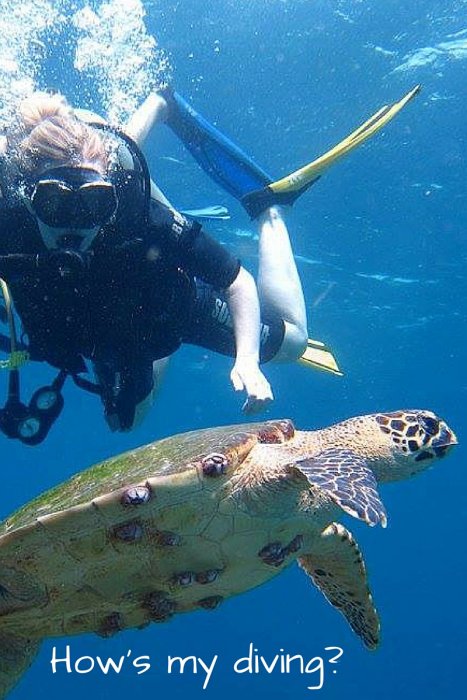5 bad scuba habits
2017-01-25 09:13:47

How is my diving?
The more dives you do, the more you see it and it is not always the beginners making mistakes. More often than not it is the more experienced divers that have developed
bad scuba habits that really should be avoided. Some are safety issues, some come down to simple scuba diving etiquette. It doesn't matter how many dives you have done in the past, there is no excuse to make these
5 bad scuba habits a reality.
1.
SKIPPING THE BUDDY CHECK
I know - It is so easy to simply ask your buddy, "all ok?" and then jump in the water. However, the procedures you learned in your
Open Water Course were taught to you for a reason.
I have actually seen divers miss the buddy check, jump in the water, pull themselves down a line to the deepest part of the dive, only to find they have forgotten their weight belt but didn't realise because they pulled themselves down the line. At this point the only viable option is to go slowly back up the line and abandon the dive.
It is way too easy (and too lazy) to jump in the water only to find OOPS, I forgot my weight belt!
You may be reading this and thinking, 'Ridiculous! I would never forget my weight belt' but what you should be thinking is, 'Ridiculous! I would never skip my buddy check'. In this case you are right; you will never forget your weight belt as long as you are doing a buddy check.
No amount of scuba diving experience will ever mean the pre-dive safety check (aka buddy check) is not necessary.
It's not only weight belts that are forgotten. Is your air on properly? Is your tank strap tight? Are your fins on? (Seriously, it happens!) The fact is the buddy check is an opportunity to prevent problems before they happen. Don't miss it, whether you have 1 dive or thousands of dives in your logbook.
2.
INCORRECT WEIGHTING
If you want to carry around extra kilos on a dive, that is up to you but why? Given the option wouldn't you rather dive weightlessly and easily? Being over-weighted only increases your air consumption because you are working harder to carry the extra weight!
One of the best diving courses you can do to assist you with this is the PADI Peak Performance Buoyancy course. You can get a taste of it if you opt for the Peak Performance Buoyancy module of the
Advanced Open Water course, or do the complete course to really fine-tune your buoyancy and make you a better diver.
3.
FORGETTING BASIC SCUBA SKILLS WHILE TAKING A PHOTO
We've all seen it! Most of us have done it at some point when first trying underwater photography. You go to take a photo of a nudibranch and as you approach, you forget about your breathing, hold your breath, and start floating away from the nudibranch!
Or you want a manta photo but the manta is gliding up and down on a saw-tooth profile that you as a diver definitely should not be doing!
Remember you breathing. Remember your buoyancy.
Think about signing up for the
Digital Underwater Photography PADI Specialty to learn how to get these things right, as well as how to get better photos overall.
4.
FORGETTING OTHER DIVERS WHILE TAKING A PHOTO
Photographers, please watch your fins as you kick other divers in the face flailing around taking your photo! Please also allow other divers to see whatever it is you are taking a photo of. (If it isn't moving, then be patient!) Finally, before you start chasing after that manta ray (which you should not be doing anyway!), and diving crazy profiles that are not good for you, please spare a moment for your buddy who is desperately trying to stay with you and not lose you, while also seeing the manta ray!
Have some respect and remember there is not only you in the water.
5.
ASCENDING TOO FAST FROM THE SAFETY STOP
This is my absolute pet-hate. I hate to see it. Divers take a safety stop at 5 metres for 3 minutes but when their computer or watch shows the three minutes over, they start swimming to the surface at rocket-speed, or worse they hit the inflator button on their BCD.
DO NOT DO THIS. The greatest pressure change is from 5 metres to the surface and you have just been breathing compressed air at depth presumably for the last 30 minutes to one hour depending on your air consumption. Despite having stayed for three minutes at five metres, you are still at risk of decompression illness. Yes, you can still get decompression illness from five metres so please remember to ascend slowly.
TIP: You should be ascending no faster than 18 metres/min. As a rough-guide, that is no faster than the smallest bubble you can see ascending in the water around you as you ascend.


